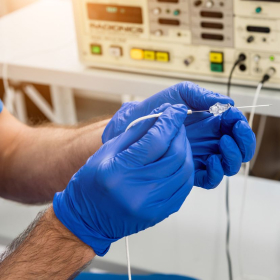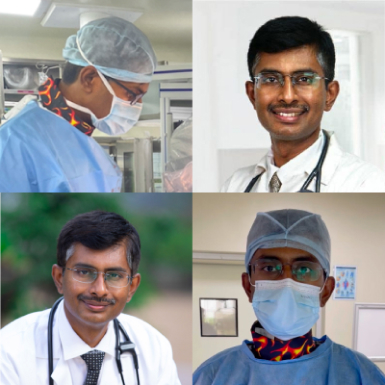"Leadless Pacemaker Implantation – Expert Heart Care by Dr. Deep Chandh Raja"

Dr. Deep Chandh Raja, a leading pacemaker specialist in Chennai, provides advanced and personalized care for patients suffering from heart rhythm disorders. With over 17+ years of experience in cardiac care, Dr Deep Chandh Raja specializes in cutting-edge procedures, including leadless pacemaker implantation, a revolutionary alternative for managing bradycardia and other heart rhythm abnormalities.
What is Leadless Pacemaker Implantation?
A leadless pacemaker is a state-of-the-art device for treating heart rhythm disorders, such as bradycardia (slow heart rate). Unlike traditional pacemakers, the leadless pacemaker is implanted directly into the heart without external leads or wires. This minimally invasive procedure offers several benefits over conventional pacemakers, including:
- No Leads or Wires:Reduces the risk of complications such as lead dislodgement and infection.
- Smaller Size and No Visible Scarring:The device is small and implanted through a catheter inserted into a vein, with no need for an incision on the chest.
- Faster Recovery:Patients experience minimal downtime and can typically return to daily activities within days.
Dr. Deep Chandh Raja is highly skilled in implanting leadless pacemakers, ensuring that each patient receives the most effective and personalized heart care.


The Leadless Pacemaker Insertion: Purpose
Unlike traditional pacemakers, the leadless pacemaker is a small device implanted directly into the right ventricle through a minimally invasive femoral vein approach. This eliminates the need for a chest incision or a generator pocket under the skin.
Dr Deep Chandh Raja recommends the leadless pacemaker for patients with:
- Bradycardia with symptoms like dizziness or fainting
- Bradycardia-Tachycardia syndrome
- Atrial Fibrillation with AV block
- Atrial Fibrillation causes slow heart rates or pauses
- Complete heart block in elderly patients
The leadless pacemaker is also suitable for patients who need pacing only occasionally. It offers a safer, simpler, and more comfortable solution for managing heart rhythm issues.
Types of Leadless Pacemakers
There are two main types of leadless pacemakers:
1.Single-Chamber Leadless Pacemaker
This pacemaker is designed to regulate the right ventricle. It's often used for patients with bradycardia (slow heart rate) who don't need pacing in the atrium.
Key Features:
- Only controls the rhythm of the right ventricle.
- Ideal for simpler heart rhythm problems
2.Dual-Chamber Leadless Pacemaker
This pacemaker regulates both the right atrium and right ventricle, making it suitable for patients with more complex conditions, like Atrial Fibrillation or AV block, where both chambers need pacing.
Key Features:
- Only controls the rhythm of both the atrium and ventricle.
- Used for patients needing synchronized pacing between both chambers.
Both types offer a safer, smaller alternative to traditional pacemakers without the need for wires or chest incisions.
Leadless Pacemaker Implantation: Evaluative test
Before and after leadless pacemaker implantation, several tests are performed to ensure proper function and assess the patient's condition.
Pre-Implantation Tests:
- Electrocardiogram (ECG): Measures the heart's electrical activity to identify any irregular rhythms.
- Echocardiogram: Assesses the heart's structure and function.
- Chest X-ray: Ensures there are no issues that could affect the implantation.
- Blood Tests: Checks for underlying conditions or infections.
- Holter Monitoring: Monitors heart rhythms over 24-48 hours to track symptoms.
During the Procedure:
- Fluoroscopy: Real-time X-ray helps guide the pacemaker placement in the right ventricle.
- Electrophysiology Testing: Confirms the pacemaker's pacing function and adjusts settings if needed.
Post-Implantation Monitoring:
- ECG Monitoring: Ensures the pacemaker is maintaining a stable rhythm.
- Device Check: Checks the pacemaker's battery and settings using an external programmer.
- Follow-up Appointments: Regular visits to monitor performance and adjust settings as necessary.
These tests help ensure the pacemaker is working correctly, improving heart rhythm control and reducing complications.
The Leadless Pacemaker Implantation Procedure
Before implantation,Dr Deep Chandh Raja will conduct a series of tests to assess your heart's health and suitability for the leadless pacemaker:
- ECG (Electrocardiogram):To monitor your heart's rhythm.
- Echocardiogram: To evaluate the structure and function of your heart.
- Blood Tests: To check for underlying conditions and confirm you're in good health for the procedure.
During your initial consultation, Dr. Deep Chandh Raja will discuss the procedure, answer any questions, and guide you through the preparation process, which typically includes fasting for several hours before the surgery.
The leadless pacemaker implantation is typically performed under local anaesthesia, and the procedure is minimally invasive. Here's what to expect:
- Insertion of the Catheter: A small catheter is inserted through the femoral vein in the leg.
- Device Placement: The pacemaker is carefully guided into the heart's right ventricle using advanced imaging technology.
- Device Testing: Once in place, the device is tested to ensure it functions properly.
The procedure is typically completed within 60 minutes, and patients are monitored in a recovery area for a few hours post-procedure.
Post-operative care is simple, and Dr Deep Chandh Raja ensures that every patient receives comprehensive guidance for a smooth recovery:
- Activity Restrictions: Avoid heavy physical activity for several weeks.
- Follow-Up Appointments: Regular follow-up visits to monitor the pacemaker's performance and ensure optimal functioning.
- Signs of Infection: Keep an eye on the insertion site for any signs of infection or discomfort, and contact Dr Deep Chandh Raja immediately if any concerns arise.
With the procedure's minimally invasive nature, most patients return to normal daily activities within a few days.
Benefits of Leadless Pacemakers
Choosing a leadless pacemaker offers numerous advantages over traditional pacemakers:
- Minimized Risk of Complications: No external leads mean fewer risks of infections and lead fractures.
- Faster Recovery and Shorter Hospital StaySince the procedure doesn't require large incisions, recovery time and hospital stay are shorter.
- Discreet and Comfortable: The device is small, and there is no visible scarring or discomfort associated with traditional pacemaker implants.
- Long-Term Reliability: Leadless pacemakers are designed to provide long-lasting, reliable heart rhythm management.
With Dr. Deep Chandh Raja's expertise, you can expect the highest standards of care and the most advanced treatment available for heart rhythm disorders.
Why Choose Dr. Deep Chandh Raja – Your Trusted Pacemaker Specialist in Chennai?
When it comes to heart health, you want an experienced and skilled specialist. Dr. Deep Chandh Raja stands out as one of Chennai's top pacemaker specialists, providing:
- 17+ Years of Expertise: A seasoned cardiologist with extensive experience in advanced cardiac procedures, including leadless pacemaker implantation.
- Patient-Centred Approach: Each treatment is customized to meet the patient's unique needs.
- Cutting-Edge Technology: Access to the latest, most advanced pacemaker technologies ensures the best patient care.
- Proven Success: Dr Deep Chandh Raja has a high success rate. He has done over 10,000 successful procedures. His satisfied patients prove his commitment to the best heart care.
If you need a heart rhythm consultation or a leadless pacemaker, Dr Deep Chandh Raja can help. He offers expert care throughout the process.
Schedule a consultation today with Dr Deep Chandh Raja
If you have heart rhythm issues,Dr Deep Chandh Raja can help. He is a trusted leadless pacemaker specialist in Chennai. He offers a safe, effective solution. Book an appointment today to discuss your options. Let us help you restore your heart health with the latest pacemaker technology.
"Revolutionizing Heart Care with Leadless Pacemakers – Schedule Your Consultation Now!"
FAQ
A leadless pacemaker is a small device placed inside the heart. It helps control the heart's rhythm. This is especially important for patients with bradycardia, a slow heart rate.
Unlike traditional pacemakers, leadless pacemakers do not use wires to connect to the heart. They are self-contained and placed inside the heart.
Candidates are usually patients with symptomatic bradycardia. They do not require dual- chamber pacing, which involves pacing both the atrium and ventricle. Dr Deep Chandh Raja will assess your heart condition and overall health to decide if a leadless pacemaker is right for you.
Advantages include:
- No leads, reducing the risk of complications like infection or lead displacement.
- A smaller size leads to a less invasive procedure.
- Lower risk of damage to blood vessels and heart tissues.
- Fewer long-term complications related to lead management.
A leadless pacemaker monitors the heart's electrical activity. It sends pulses to regulate the heart rate when it detects a slow rhythm. A battery powers it and doesn't require leads, which reduces the risk of complications.
Dr Deep Chandh Raja implanted the pacemaker through a catheterization procedure. He inserts the device through a small incision in the leg and guides it to the heart using imaging. The procedure takes 30 to 60 minutes; doctors typically perform it under local anaesthesia.
Experts consider leadless pacemakers safe and effective for treating certain heart rhythm disorders. All medical procedures have some risk. However, studies show leadless pacemakers are exceptionally safe and have few complications.
Possible side effects or complications include:
- Infection at the implantation site.
- Device dislodgment or malfunction.
- Rare issues such as bleeding or damage to nearby structures during the procedure.
Leadless pacemakers typically last 5 to 10 years, depending on the device and the patient's heart rate needs. Once the battery runs out, you will need to replace the device.
Many leadless pacemakers can work with MRI machines. However, talking to Dr Deep Chandh Raja before imaging tests is essential. This will help ensure the device is safe for your health condition.
Follow Dr Deep Chandh Raja's instructions regarding activity restrictions, wound care, and follow-up visits. Doctors advise patients to avoid heavy lifting and strenuous activities until the implantation site heals.
Doctors need to use a pacemaker when a patient has irregular heartbeats, bradycardia (slow heartbeats), or heart block. These conditions can lead to poor blood circulation. The pacemaker helps regulate the heart's rhythm by sending electrical signals to maintain an average heart rate.
The cost of a leadless pacemaker in Chennai, India ranges from ₹1.5 lakh to ₹3 lakh. This price depends on the hospital, device model, and other factors. This estimate does not include surgery or follow-up care costs. For an accurate estimate, consult Dr Deep Chandh Raja.
A pacemaker is a small device that runs on batteries. The size of a matchbox is the subject. Usually, it measures 1.5 to 2 inches wide and is about half an inch thick.
It has two parts: the pulse generator and the leads. The pulse generator holds the battery and controls electrical impulses.
The leads are thin wires that connect the device to the heart. Dr. Deep Chandh Raja places the pacemaker under the skin near the collarbone. The leads send signals to control the heartbeat.
Dr Deep Chandh Raja places a leadless pacemaker directly inside the heart, usually in the right ventricle. The procedure is minimally invasive. He inserts a catheter through a vein in the leg. This method removes the need for wires or leads.
The Micra leadless pacemaker is a type of pacemaker implanted directly into the heart without leads. It helps treat bradycardia and offers lower infection risk, less discomfort, and minimal impact on daily activities. It monitors heart rhythms and provides pacing as needed.
Dr Deep Chandh Raja is Chennai's leading cardiologist and electrophysiologist, specializing in pacemaker implantation. He has performed over 10,000 successful procedures, earning high trust for his skill and experience.
Dr. Deep Chandh Raja has over 10 years of experience in cardiology. People recognize him for his focus on patients and his skill in treating heart rhythm disorders. He has contributed to many medical journals, spoken at top conferences, and earned recognition for handling complex cardiac cases.
Dr Deep Chandh Raja has won several awards for his excellence in the field. He remains dedicated to improving cardiac care in India.
Cases performed By DR DCR – Best Leadless pacemaker specialist in chennai

Micra leadless pacemaker Chennai
Cardiac Electrophysiolgists are specialists in placing and managing Leadless pacemakers. Dr Deep Chandh Raja is a cardiac electrophysiology specialist who has performed Micra leadless pacemaker device procedure in more than 20 patients. This is a 84-year female who benfitted from this very safe procedure. This procedure was completed in less than 30 minutes.






